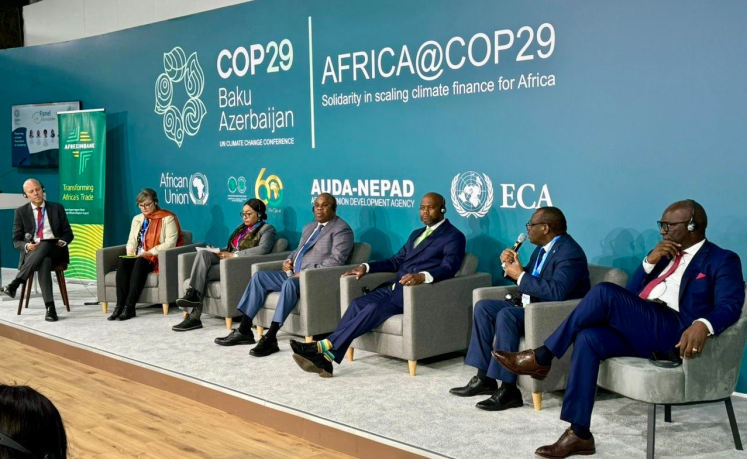As the world convenes for the COP29 climate conference in Baku, Azerbaijan, the stakes are high, particularly for Africa. This conference will play a pivotal role in shaping Africa’s climate agenda, addressing critical issues such as accessible and equitable climate finance, just energy transition pathways, and the operationalization of crucial climate funds. Africa is at the frontline of the climate crisis, with devastating droughts in the Horn of Africa, catastrophic flooding in West and southern Africa, and rising temperatures that threaten food security and livelihoods across the continent.
Africa, home to 20% of the world's population, receives a mere 2% of global spending on clean energy. With 75% of the world's energy-deprived populations residing in Africa and a projected population of 2.5 billion by 2050, climate finance and energy security are inextricably linked. However, African nations currently receive a paltry 3-4% of global climate finance, hindering their ability to transition to renewable energy, adapt to climate impacts, and address climate-related disasters. At the African Ministerial Conference on the Environment (AMCEN), ministers called for a significant increase in climate finance, requesting $1.3 trillion annually by 2030 to support their Nationally Determined Contributions (NDCs) and clean-energy initiatives. The fact that new climate finance pledges from COP26 may not even meet the $100 billion target set in Copenhagen in 2009 when adjusted for inflation underscores the persistent and alarming shortcomings in global climate finance. This "conspiracy of constraints" limits Africa's ability to meet its own energy needs and undermines its capacity to contribute effectively to global decarbonization efforts.
COP29, dubbed the "climate finance COP," will provide a platform for these discussions, particularly around the structure and contributors to the New Collective Quantified Goal on Climate Finance (NCQG). This goal will replace the previous $100 billion annual target set in 2009, achieved two years late and with significant concerns over the quality of finance mobilized. The NCQG is crucial for scaling up climate finance to developing countries, particularly in Africa, to tackle the scale of the prevailing crisis. However, there are ongoing debates about the structure of the NCQG, including who should contribute, what types of finance should be included, and the enforcement mechanisms to ensure that the promised finance is delivered. While the EU and the US have proposed a multi-layered approach to climate finance that includes private and domestic funding alongside public funds, African nations and others in the Global South advocate a more straightforward structure emphasizing direct public financing from developed countries.
The conference will also focus on operationalizing the Just Transition Work Programme (JTWP), established at COP28, to guide equitable and inclusive pathways to a low-carbon economy. For example, the Just Energy Transition Partnership (JETP) for South Africa, announced at COP26, has secured only a fraction of the funds it needs, mainly in the form of foreign currency loans, which may not have the desired catalytic effect on mobilizing private capital, emphasizing the need for better disbursement methods and more concessional capital to avoid these issues.

COP29 is anticipated to finalize carbon market operations under Article 6, but key divisions remain on timing, authorization forms, methodology guidance, and whether international registries will facilitate emission credit transactions. Addressing these points is critical, as streamlined and transparent Article 6 mechanisms could attract vital funding for Africa's climate initiatives, enabling investment in renewable energy, adaptation projects, and infrastructure that supports low-carbon transitions across the continent.
Furthermore, with significant outcomes from COP27 and COP28, the Loss and Damage Fund is expected to make progress at COP29 with discussions about its scale, scope, and eligibility criteria. African nations are looking closely at how this fund can be structured to provide tangible benefits to the affected communities. Although pledges have been made recently, such as the commitment to provide $661 million, only $10 million has been delivered to the fund by the Government of Japan.
The Mitigation Work Programme (MWP), finalized at COP28, aims to accelerate clean energy transitions by 2030. COP29 will be pivotal in shaping its future, with discussions likely focused on balancing ambitious climate goals with equitable approaches, reflecting the diverse priorities of both developed and developing nations.
Africa's negotiating teams are also expected to continue advocating natural gas as a necessary transition fuel, underscoring the continent's pressing developmental challenges and energy security demands. While the shift to renewable energy is a priority, African nations require pragmatic, phased approaches that address immediate energy deficits and support their economic growth during the transition.
Although COP29 presents a vital opportunity to secure transformative climate financing and establish effective carbon markets to advance Africa’s low-carbon transition, significant gaps in global climate finance remain a pressing concern. These shortcomings highlight the urgent need for developed nations to reevaluate their commitments and deliver more ambitious, equitable support to developing countries. If these systemic issues are not addressed, the "policy windmill" will continue to operate, leaving vulnerable regions like Africa to bear the brunt of climate impacts without sufficient resources to adapt or transition.
Links:
- https://www.iea.org/reports/financing-clean-energy-in-africa/executive-summary
- https://www.csis.org/analysis/achieving-universal-energy-access-africa-amid-global-decarbonization
- https://www.afdb.org/en/news-and-events/press-releases/climate-change-finance-natural-capital-accounting-african-countries-top-african-development-bank-groups-agenda-cop29-78448
- https://www.uneca.org/stories/ahead-of-cop29-in-baku%2C-abidjan-hosts-the-12th-climate-change-and-development-in-africa
- https://unfccc.int/NCQG
- https://unfccc.int/process/the-paris-agreement/cooperative-implementation
- https://unfccc.int/sites/default/files/resource/Status%20of%20resources_final-Rev1.pdf




